As Trump cuts aid and intelligence sharing, Europe scrambles to fill the void while Ukraine and Russia position for high-stakes peace talks. Meanwhile, Putin rejects all concessions as Russian missiles continue to rain down on Ukrainian cities.
Summary of the Day – March 6, 2025
The battlefield of Ukraine has shifted dramatically to the diplomatic arena, with European leaders gathering in Brussels for an emergency summit while President Zelensky announced a tentative return to negotiations with the United States. The day’s developments reveal a Europe struggling to define its security future in the wake of America’s retreat, as Russia emphatically rejects any concessions while continuing to pound Ukrainian cities with missiles. A delicate choreography is now unfolding—France extending possible nuclear protection, Ukraine proposing limited truces, and the U.S. engaging with both Kyiv and Moscow while reportedly courting Zelensky’s political rivals behind the scenes. All this occurs against the backdrop of suspended American military aid and intelligence sharing, leaving Ukrainian cities more vulnerable to Russian strikes, as evidenced by yesterday’s deadly hotel bombing in Kryvyi Rih that killed four people.
BATTLEFIELD CHESSBOARD: INCREMENTAL ADVANCES AMID THE DIPLOMATIC STORM
Despite the flurry of diplomatic activity, the grim reality of war persisted along the sprawling eastern front. Ukrainian forces recently advanced in eastern Pishchane southwest of Pokrovsk, demonstrating that Kyiv’s military still maintains offensive capabilities despite dwindling Western support.
Russian forces, meanwhile, secured several small but strategic gains across multiple sectors, seizing Zelene Pole east of Pokrovsk, advancing west of Nadiya east of Borova, pushing west of Bilohorivka northeast of Siversk, and making headway southwest of Rozlyv near Kurakhove. These dispersed advances reflect Moscow’s strategy of applying pressure across a wide front to stretch Ukrainian defenses.
The Ukrainian General Staff reported a successful strike on a Russian 177th Naval Infantry Regiment command post in Plekhovo south of Sudzha on March 5, part of a broader campaign to degrade Russian offensive capabilities through precision targeting of command structures.
“Such Ukrainian strikes are part of a broader campaign to reduce Russian offensive capabilities,” the Ukrainian General Staff stated, hinting at a strategic shift toward high-value targeting as conventional defense resources become more constrained.
THE NIGHT SKY WARFARE: MISSILES RAIN DOWN AS INTELLIGENCE SHIELD FALLS
Russian forces launched a devastating aerial assault overnight, sending 112 Shahed and decoy drones across Ukrainian airspace—the first major barrage since the U.S. suspended critical intelligence sharing.
Without American early warning data, Ukrainian air defenses managed to down 68 drones over multiple oblasts, while 43 others were “lost”—likely due to electronic warfare interference. The attacks struck residential buildings, administrative buildings, and energy infrastructure in Kharkiv, Sumy, and Odesa oblasts.
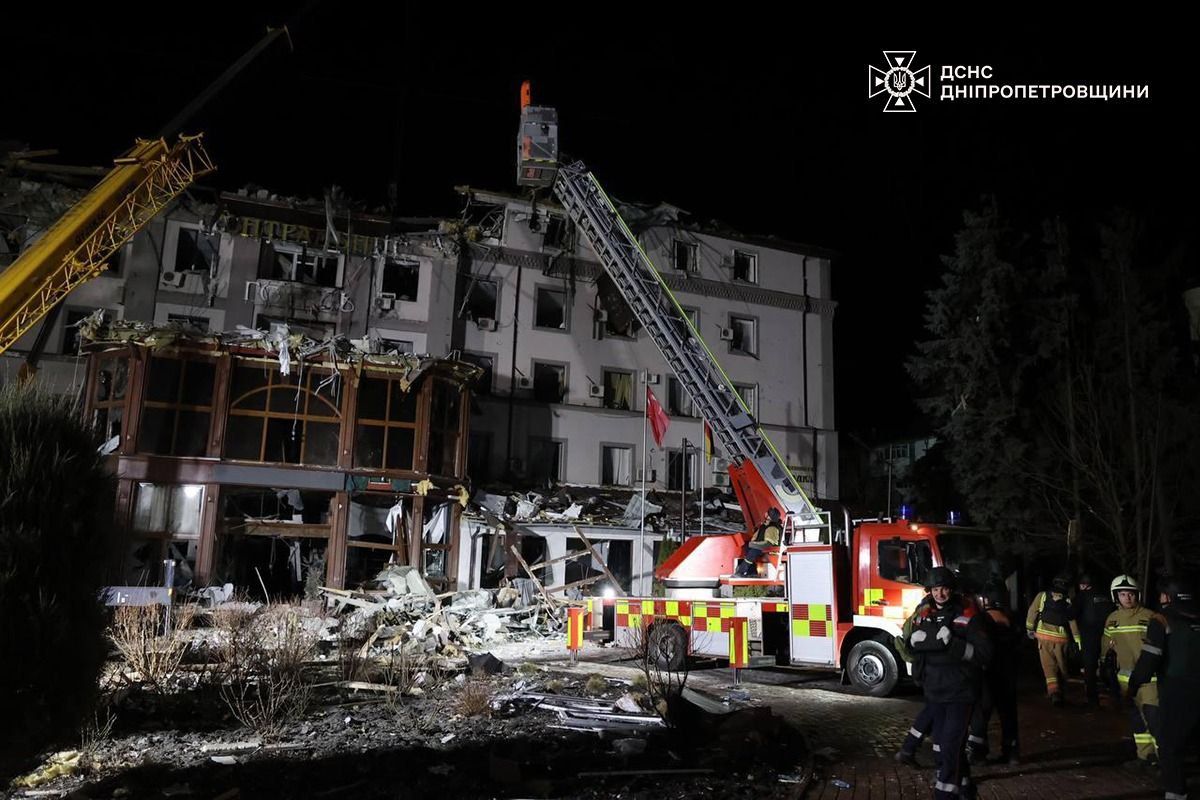
Most tragically, a Russian ballistic missile struck a hotel in Kryvyi Rih, President Zelensky’s hometown, killing four people and injuring at least 32 others, including a child. “Just before the strike, volunteers from a humanitarian organization checked into the hotel—citizens of Ukraine, the U.S., and the U.K.,” Zelensky noted grimly. “They survived because they managed to escape their rooms.”
The attack damaged 14 apartment buildings, a post office, almost two dozen cars, a cultural center, and 12 shops—comprehensive civilian impact that U.S. intelligence has historically helped Ukraine anticipate and mitigate.
ZELENSKY’S OLIVE BRANCH: UKRAINE AND U.S. RESUME TALKS
Standing before the European Council in Brussels, President Volodymyr Zelensky made a significant announcement: “Our teams – Ukraine and America – have resumed work. We hope that next week we will have a meaningful meeting.”
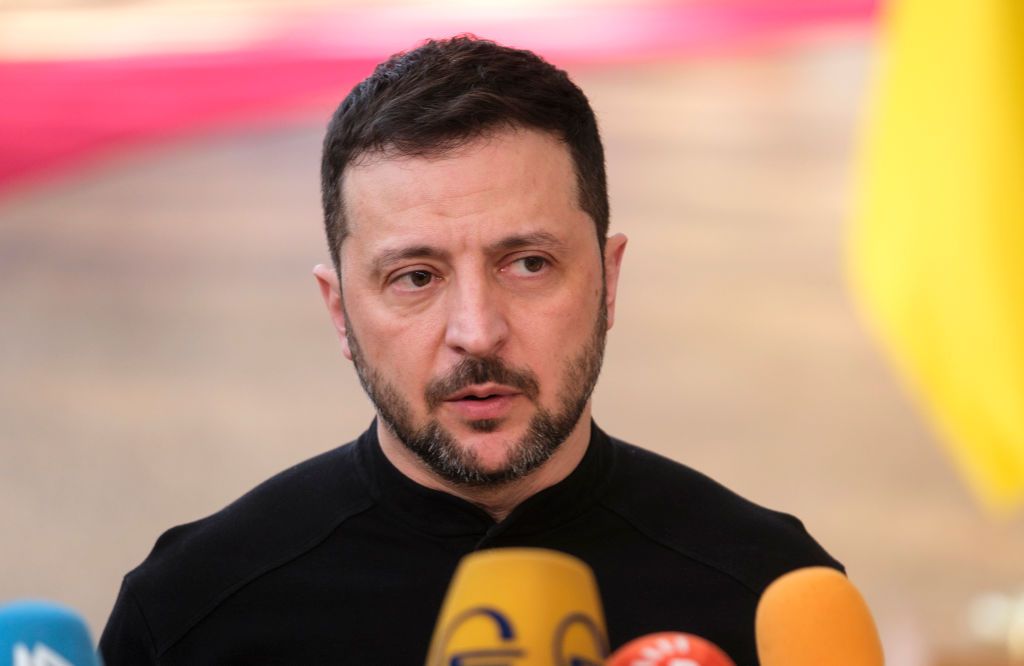
The statement marks a potential thaw in relations after the dramatic Oval Office confrontation that saw Trump eject Zelensky and freeze all military aid and intelligence sharing. According to White House correspondent Jacqui Heinrich, the meeting is scheduled for March 11, with Ukraine’s delegation led by Zelensky’s Chief of Staff, Andriy Yermak, facing a U.S. team that includes Secretary of State Marco Rubio, National Security Advisor Mike Waltz, and Middle East envoy Steve Witkoff.
Zelensky outlined specific peace steps, proposing “two forms of silence” as confidence-building measures: a halt to attacks on energy infrastructure and civilian targets, and a cessation of military operations in the Black Sea. He emphasized that “Ukraine is not only ready to take the necessary steps for peace, but we are also proposing what those steps are.”
Meanwhile, President Trump claimed “a lot of progress” in dealings with both Ukraine and Russia over recent days, though he offered no details on the nature of these advancements.
THE KREMLIN’S STONE WALL: PUTIN REJECTS ALL CONCESSIONS
As diplomatic contacts intensified, Vladimir Putin firmly slammed the door on compromise. During a visit to the Defenders of the Fatherland Foundation in Moscow, the Russian president explicitly stated that Russia “does not intend to give in to anyone” or make concessions in future peace negotiations.
“Russia must choose a peace option that best suits Russia,” Putin declared, emphasizing Russian societal unity as critical for victory in Ukraine. In a telling rhetorical flourish, he alluded to the Russian Revolution, noting that Russian society collapsed during World War I, and urged Russians to maintain support as the war continues.
Foreign Minister Sergei Lavrov reinforced this hardline stance, claiming Russia will reject any proposals to station European peacekeeping forces in Ukraine. “We see no room for compromise,” Lavrov stated, equating the presence of European peacekeepers with NATO deployment—a red line for Moscow.
The Kremlin’s position demands that any peace deal address the alleged “root causes” of the conflict, including guarantees against NATO expansion and protection for Russian language and culture in Ukraine—preconditions that effectively call for Ukraine’s surrender of sovereignty.
INTELLIGENCE BLACKOUT: AMERICA CUTS THE LIFELINE AS MISSILES FALL
The consequences of America’s diplomatic pressure tactics became devastatingly clear on the night of March 5-6, when Russian forces launched a barrage of missiles and drones across Ukraine—the first such attack since the U.S. suspension of intelligence sharing.
Without U.S. intelligence warning of incoming strikes, Ukrainian air defenses faced a more difficult challenge intercepting Russian projectiles. The attack included two Iskander-M/KN-23 ballistic missiles and 112 Shahed and decoy drones launched from multiple locations in Russia and occupied Crimea.
Defense Minister Rustem Umerov acknowledged the challenge, stating that Ukraine has not yet received detailed information on U.S. intelligence-sharing restrictions but is already exploring alternatives. “We are already working on alternatives, including requesting assistance from Germany, if necessary,” Umerov said at a press conference in Berlin.
The intelligence cutoff threatens Ukraine’s ability not only to track Russian military movements but to protect civilian populations from aerial bombardment—a vulnerability immediately exploited by Russian forces.
FRANCE STEPS INTO THE VOID: LECORNU PLEDGES INTELLIGENCE SUPPORT
As American support retreated, French Defense Minister Sebastien Lecornu quickly stepped forward, announcing that France would continue providing military intelligence to Ukraine despite Washington’s suspension.
“We have intelligence resources that we are providing to the Ukrainians,” Lecornu stated on France Inter radio. He added that French President Emmanuel Macron had instructed him to “accelerate the delivery of French aid packages to compensate for U.S. aid that no longer arrives.”
The move underscores Europe’s scramble to fill the vacuum created by America’s withdrawal, coming as European leaders gathered in Brussels for an emergency security summit focused on bolstering continental defense capabilities.
“DESTROYING THE WORLD ORDER”: ZALUZHNYI’S STARK WARNING
Ukraine’s former commander-in-chief and current ambassador to the U.K., Valerii Zaluzhnyi, delivered a blistering assessment of American policy at a Chatham House appearance.
“The U.S. is destroying the world order as Washington is making overtures to the Kremlin,” Zaluzhnyi declared, arguing that the Trump administration has questioned the unity of “the whole Western world.”
“Now Washington is trying to delegate the security issues to Europe without participation of the U.S. so we can say that in the near future, NATO likewise can stop existing,” the ambassador warned, framing America’s retreat as an existential threat to the post-World War II security architecture.
Zaluzhnyi cautioned that Europe itself could be Russia’s next target, noting that Moscow’s key allies—Iran and North Korea—are already supplying weapons and troops to the Russian war effort. “We see that it’s not just the axis of evil and Russia trying to revise the world order, but the U.S. is finally destroying this order,” he concluded, painting a dire picture of a fracturing Western alliance.
THE BRUSSELS HUDDLE: EU LEADERS AFFIRM SUPPORT BUT DODGE SPECIFICS
The emergency European Council meeting in Brussels produced strong rhetoric but few concrete commitments to fill the security gap left by America’s retreat.
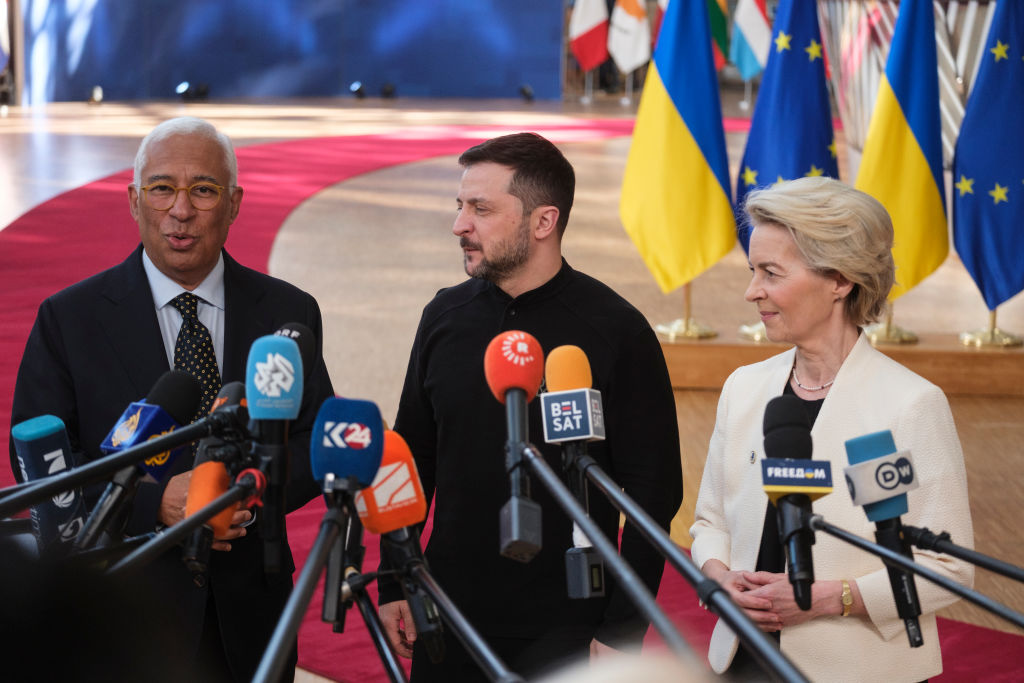
European Council President Antonio Costa (L), President Volodymyr Zelenskyy (C) and European Commission President Ursula von der Leyen (R) talk to the media prior to the start of an EU Summit in Brussels, Belgium. (Thierry Monasse/Getty Images)
The EU reaffirmed its “continued and unwavering support” for Ukraine but struggled to articulate how Europe would provide lasting security guarantees without U.S. backing. When pressed on this point, European Council President Antonio Costa and European Commission President Ursula von der Leyen sidestepped specifics.
“The best security guarantee are the Ukrainians themselves,” Costa said, praising Ukraine’s three-year defense against Russia’s invasion. Von der Leyen echoed this sentiment: “The best security guarantee is the Ukrainian army.”
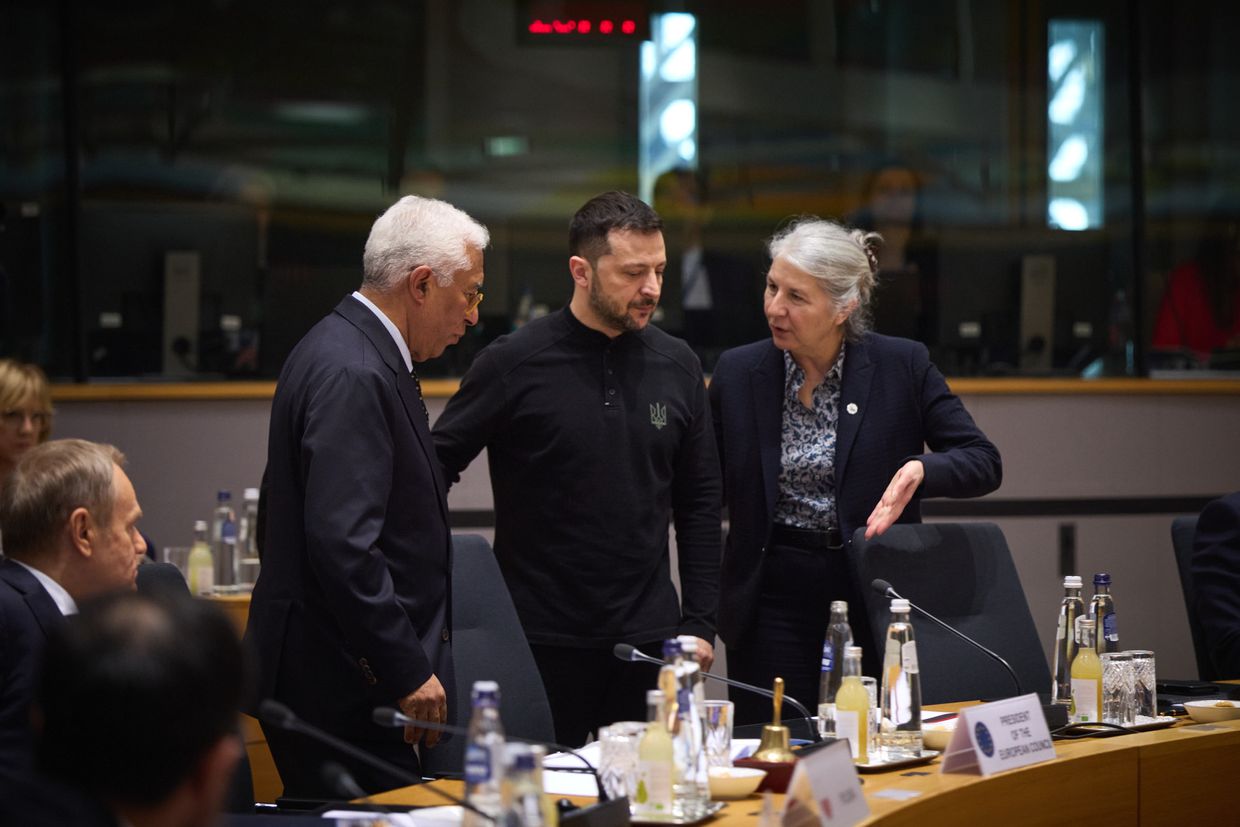
The summit’s concluding statement pledged “enhanced political, financial, economic, humanitarian, military, and diplomatic support to Ukraine” while “stepping up pressure on Russia,” but left open questions about implementation without American partnership.
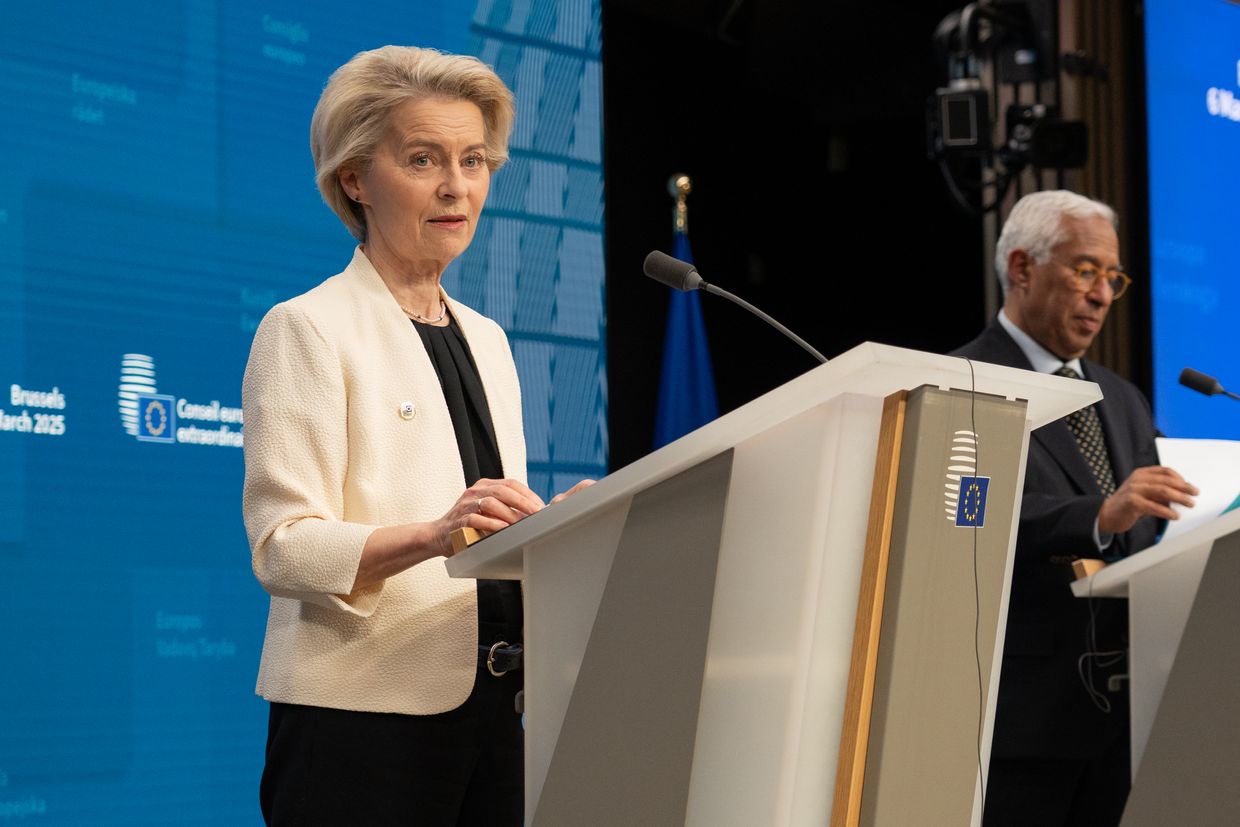
THE NUCLEAR UMBRELLA: MACRON’S PROPOSAL GAINS TRACTION
French President Emmanuel Macron’s suggestion that Paris could extend its nuclear umbrella to protect European allies found receptive ears among Eastern European leaders most directly threatened by Russia.
“This readiness of France, this is something very promising,” Polish Prime Minister Donald Tusk told reporters in Brussels. “We have to treat this proposal seriously.”
Lithuanian President Gitanas Nauseda called it a “very interesting idea,” noting that a nuclear umbrella would serve as effective deterrence against potential Russian aggression. Both Poland and Lithuania, situated on NATO’s eastern flank and bordering Russia’s ally Belarus and the Kaliningrad exclave, stand at the frontline of any potential NATO-Russia confrontation.
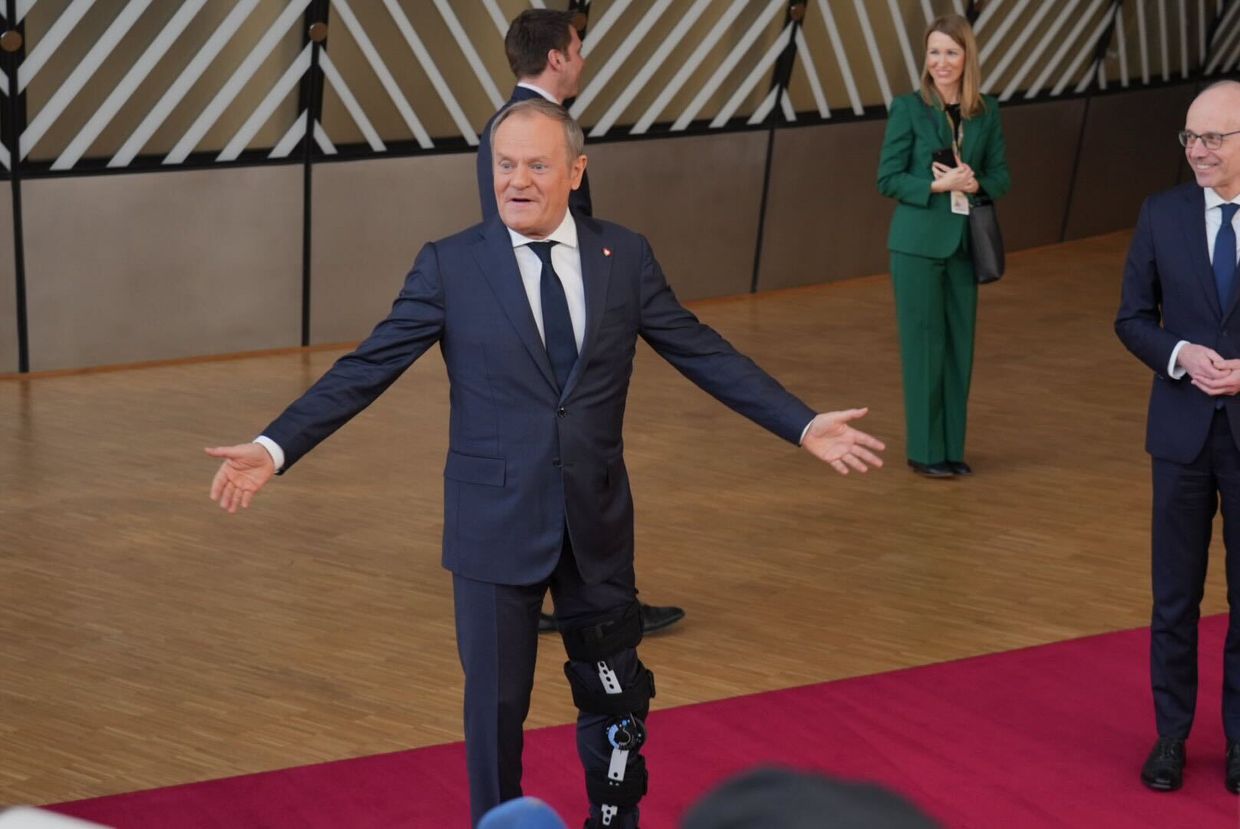
Donald Tusk, Poland’s prime minister, arrives for a special European Council meeting in Brussels, Belgium. (Olena Zashko/The Kyiv Independent)
The discussion of French nuclear sharing represents perhaps the most dramatic example of Europe’s reconsideration of its security architecture as uncertainty grows about America’s commitment under President Trump.
SKY SHIELD: EUROPE CONSIDERS AIR DEFENSE OVER UKRAINE
As missiles continued to strike Ukrainian cities, military experts proposed deploying European air forces to protect Kyiv and other non-frontline Ukrainian cities from Russian aerial attacks.
The Guardian reported on a plan dubbed “Sky Shield,” which could potentially operate as part of Zelensky’s proposed “truce in the sky.” The project, developed by former British Air Force planners in cooperation with Ukraine’s Armed Forces, envisions a European-led air defense zone involving 120 fighter jets operating separately from NATO.
This protection zone would cover Ukraine’s three operational nuclear power plants and major cities like Odesa and Lviv, though not the eastern front lines where battles rage in Donetsk Oblast.
Supporters include Philip Breedlove, former NATO supreme commander in Europe, Polish ex-President Aleksander Kwasniewski, and Lithuania’s former foreign minister Gabrielius Landsbergis. However, European defense ministries have hesitated, fearing escalation if aircraft from either side were attacked.
ISTANBUL REJECTED: KELLOGG DISMISSES RUSSIAN-FAVORED FRAMEWORK
In a significant policy statement, Keith Kellogg, U.S. Special Envoy for Ukraine, definitively rejected the 2022 Istanbul peace framework that Russia has repeatedly pushed as the basis for negotiations.
“The Istanbul accords happened 30 days after the invasion, and the demands in Istanbul were fairly significant on a very weakened Ukraine,” Kellogg said at the Council on Foreign Relations. He emphasized that such agreements do not represent an “equitable framework” for all parties and that the U.S. should “develop something entirely new.”
This marks a rare point of alignment between the Biden and Trump administrations, as the former also rejected the Istanbul framework, which would have forced Ukraine to adopt neutrality, abandon NATO aspirations, impose severe military restrictions, and delay resolution of Crimea’s status for 10-15 years.
Kellogg’s position also seems at odds with statements from other Trump officials, including Middle East envoy Steve Witkoff, who previously suggested the Istanbul talks could serve as a foundation for future agreements.
BEHIND CLOSED DOORS: TRUMP’S TEAM COURTS ZELENSKY’S RIVALS
In a development highlighting the fractured Ukrainian-American relationship, Politico reported that four senior members of Trump’s team had engaged in secret discussions with political opponents of President Zelensky.
According to three Ukrainian parliamentarians and a Republican foreign policy expert, Trump’s allies met with opposition leader Yulia Tymoshenko and senior figures from former President Petro Poroshenko’s party. These discussions reportedly centered on the possibility of early elections in Ukraine, which have been postponed due to martial law as required by the constitution.
Both Poroshenko and Tymoshenko responded to the report with careful statements. Poroshenko said his team works “publicly and transparently with American partners” to ensure bipartisan support for Ukraine, while Tymoshenko emphasized that her party remains in talks with all allies who can help secure a just peace.
The behind-the-scenes maneuvering comes after Trump criticized Zelensky as a “dictator without elections,” echoing a Kremlin narrative despite constitutional restrictions on wartime voting in Ukraine.
THE PROXY WAR NARRATIVE: RUBIO ADOPTS KREMLIN FRAMING
U.S. Secretary of State Marco Rubio raised eyebrows by describing the conflict as a “proxy war” between Washington and Moscow, language that mirrors longstanding Kremlin talking points.
“And frankly, it’s a proxy war between nuclear powers — the United States, helping Ukraine, and Russia – and it needs to come to an end,” Rubio told Fox News on March 5.
The Kremlin quickly embraced this characterization. Spokesman Dmitry Peskov stated on March 6 that the Kremlin agrees with Rubio’s framing, while Russian state media portrayed it as an “admission” that the United States is waging a proxy war through Ukraine.
This narrative aims to portray Ukraine as lacking sovereignty and justify the war to Russian audiences while discouraging Western support by stoking fears of escalation—exactly the messaging Putin has promoted since 2022.
THE KREMLIN’S NEW MAN IN WASHINGTON: PUTIN APPOINTS DARCHIEV
As diplomatic activity intensified, Putin signed a decree appointing Alexander Darchiev as Russia’s new ambassador to Washington.
Darchiev, a veteran diplomat with extensive American experience, previously served as Russia’s ambassador to Canada from 2014 to 2021 and later as director of the North American Department at the Russian Foreign Ministry.
The U.S. approved his appointment last month amid renewed diplomatic engagement between the countries, including two rounds of talks in Saudi Arabia and Turkey. While the first meeting reportedly focused on Ukraine, the second centered on embassy operations according to Russian Foreign Minister Lavrov.
The appointment comes as the Trump administration markedly shifts U.S. policy toward more direct engagement with Moscow after years of limited contact under the Biden administration.
BRITISH “MERCENARY” SENTENCED: 19 YEARS FOR UK CITIZEN IN RUSSIA
A Russian court in Kursk delivered a harsh verdict against 22-year-old British citizen James Scott Rhys Anderson, sentencing him to 19 years in prison for alleged “mercenary activities” and a “terrorist act.”
Anderson, who served four years in the British Army’s Royal Signals Corps before joining Ukraine’s International Foreign Legion, was reportedly captured in Russia’s Kursk region. Russian state media claimed he worked as an instructor for Ukrainian troops.
The trial was held behind closed doors, with a Ukrainian soldier in Anderson’s unit reportedly serving as a witness. The court said Anderson pled guilty, though the circumstances of this plea remain unclear. He is to serve the first five years in a Russian prison and the “remaining term in a maximum-security penal colony.”
Britain’s Foreign Office dismissed the charges as “false” and demanded that Russia treat Anderson as a prisoner of war under the Geneva Conventions, not as a mercenary. “We demand that Russia respect these obligations… and stop using Prisoners of War for political and propaganda purposes,” the Foreign Office stated.
CHINA’S CRITIQUE: BEIJING SLAMS TRUMP’S TREATMENT OF EUROPE
In an unusual diplomatic intervention, China’s special envoy for European affairs, Lu Shaye, criticized Trump’s treatment of European allies as “appalling” and argued against allowing the U.S. and Russia to dictate Ukraine’s fate.
“When you look at how the Trump administration has implemented a brazen and domineering policy toward Europe, treating its allies in this way, honestly, from a European perspective, it’s quite appalling,” Shaye told the South China Morning Post.
The Chinese diplomat emphasized that “various proposed solutions should be subject to equal discussion, rather than being dictated by a select few,” a pointed reference to U.S.-Russia talks that have excluded Ukraine and European powers.
The comments represent a strategic move by Beijing, which has remained a key Moscow ally throughout the war while attempting to position itself as a more reasonable global actor than the U.S. under Trump.
STARLINK ALTERNATIVES: EUTELSAT EYES UKRAINE OPPORTUNITY
As concerns mount over Ukraine’s continued access to Elon Musk’s Starlink satellite network, French satellite operator Eutelsat Communications revealed it is in advanced talks with the European Union to potentially replace the service in Ukraine.
“Everyone is asking us today, ‘Can you replace the large number of terminals of Starlink in Ukraine,’ and we are looking at that,” Eutelsat CEO Eva Berneke told Bloomberg. The company already operates in Ukraine with thousands of terminals deployed.
Starlink has been critical for Ukraine’s battlefield communications, with approximately 42,000 terminals serving the military, medical facilities, businesses, and aid organizations. Fears about its continued availability intensified after the U.S. paused military aid, with Reuters reporting that U.S. officials had raised the possibility of restricting Ukraine’s access.
Berneke said Eutelsat could supply 40,000 replacement units within “a couple of months” if needed, using a combination of OneWeb’s low Earth orbit satellites and its own geostationary satellites to provide the essential connectivity Ukraine’s military requires, including for the drone operations that have been crucial in inflicting losses on Russian forces.
TECHNOLOGY UNITED: THE INVISIBLE FRONT OF UKRAINE’S RESISTANCE
While conventional military aid stalls, an extraordinary global network of scientists, inventors, and dedicated volunteers has been quietly revolutionizing Ukraine’s defense capabilities.
Brian Robinson, founder of Technology United for Ukraine, has assembled an innovative coalition of active Ukrainian soldiers, PhD-level researchers, engineers, and self-taught hobbyists to develop cutting-edge technologies addressing immediate battlefield challenges.
“With modern technology, we can collaborate across continents,” Robinson told Kyiv Post. “There’s no reason we can’t build a second army – an army of innovators and visionaries… with 5,000 of the world’s brightest minds working together to defend Ukraine.”
The organization works directly with the Ukrainian Ministry of Defense to identify priority technological needs, ensuring every volunteer effort addresses pressing battlefield requirements. Robinson emphasizes that many breakthrough innovations have come not from academia but from hobbyists bringing fresh perspectives to complex problems.
“Weapons can be stopped. But the collective brilliance of determined minds? That’s unstoppable,” Robinson asserted, highlighting how grassroots technological innovation has become a vital, if less visible, front in Ukraine’s defense.
THE SANCTIONS CHESS GAME: BESSENT TALKS TOUGH
As the White House reportedly considers easing sanctions against Russia, U.S. Treasury Secretary Scott Bessent presented a different public stance, claiming the administration was prepared to go “all in” on sanctions to pressure Moscow to negotiate.
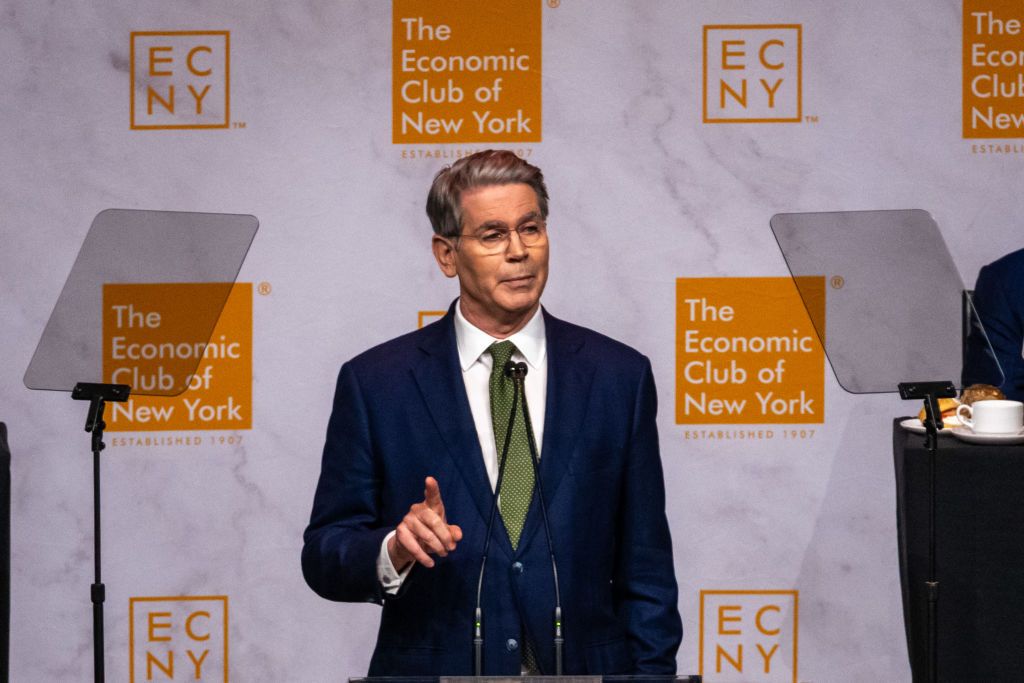
U.S. Treasury Secretary Scott Bessent speaks at the Economic Club of New York in New York City. (Spencer Platt/Getty Images)
Speaking at the Economic Club of New York, Bessent criticized former President Joe Biden for imposing “egregiously weak sanctions” on Russia and suggested the Trump administration was ready to take a harder line.
“This administration has kept the enhanced sanctions in place and will not hesitate to go ‘all in’ should it provide leverage in peace negotiations,” he said, adding that sanctions “will be used explicitly and aggressively for immediate maximum impact.”
The tough rhetoric seemed designed to counter criticism of the administration’s Russia-friendly policy shift but contrasted sharply with reports that Trump was considering lifting sanctions as part of a peace deal.
THE UKRAINIAN REFUGEE QUESTION: TRUMP DELAYS DECISION
When asked about the legal status of 240,000 Ukrainian refugees in the United States, President Trump told reporters he had not yet decided on their fate but didn’t want to “hurt” them.
Earlier in the day, Reuters reported that the administration was planning to revoke the Temporary Protected Status (TPS) of these Ukrainians, potentially paving the way for deportations. White House spokesperson Karoline Leavitt dismissed the report as “fake news,” claiming no decision had been made.
“We’re not looking to hurt anybody and we’re certainly not looking to hurt them,” Trump said in the Oval Office. “Especially Ukrainians. They’ve gone through a lot.”
The uncertainty adds another layer of complexity to Ukrainian-American relations, already strained by Trump’s suspension of military aid and intelligence sharing.
PRISONER PLEAS: FAMILIES RALLY AT U.S. EMBASSY
Relatives of Ukrainian prisoners of war and missing persons held a peaceful rally outside the U.S. Embassy in Kyiv, urging Washington to help secure the release of all Ukrainian soldiers and civilians held in Russian captivity.
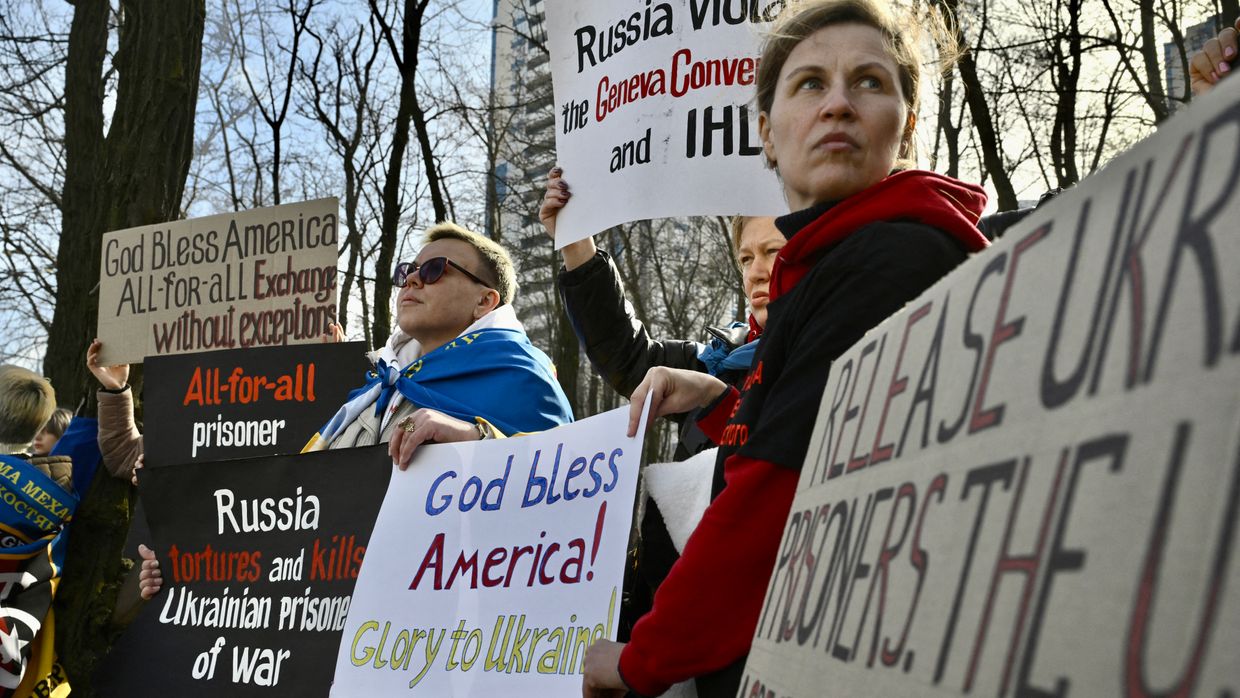
The protesters demanded an “all-for-all” prisoner exchange before any peace deal with Russia is signed, highlighting the human cost of the conflict as Trump pushes for a quick resolution.
Russia and Ukraine have conducted multiple prisoner swaps throughout the war, most recently on February 5, when Ukraine secured the return of 150 POWs. Kyiv has pushed for a comprehensive exchange since 2024, but Moscow has refused.
According to Ukraine’s Ombudsman Dmytro Lubinets, Russia holds over 16,000 Ukrainian civilians captive, while more than 19,500 Ukrainian children have been forcibly deported to Russia, Belarus, or occupied territories.
THE PATH FORWARD: UNCERTAINTY AMID SHIFTING ALLIANCES
As March 6 concluded, the future of Ukraine hung in a precarious balance. With U.S. intelligence and military support suspended, European countries scrambling to fill the gap, and Russia rejecting any meaningful concessions, the path to peace remains fraught with obstacles.
Zelensky’s announced resumption of talks with Washington offers a glimmer of hope, but Putin’s hardline stance suggests any negotiated settlement would require major Ukrainian concessions. Meanwhile, European leaders struggle to define their role in a post-American security landscape, considering unprecedented measures like a French nuclear umbrella and a European air defense mission over Ukraine.
As missiles continue to fall on Ukrainian cities and Trump’s team reportedly courts Zelensky’s political rivals, the day’s developments reveal a war entering perhaps its most dangerous and unpredictable phase—one where diplomatic maneuvers may prove as consequential as battlefield advances.
